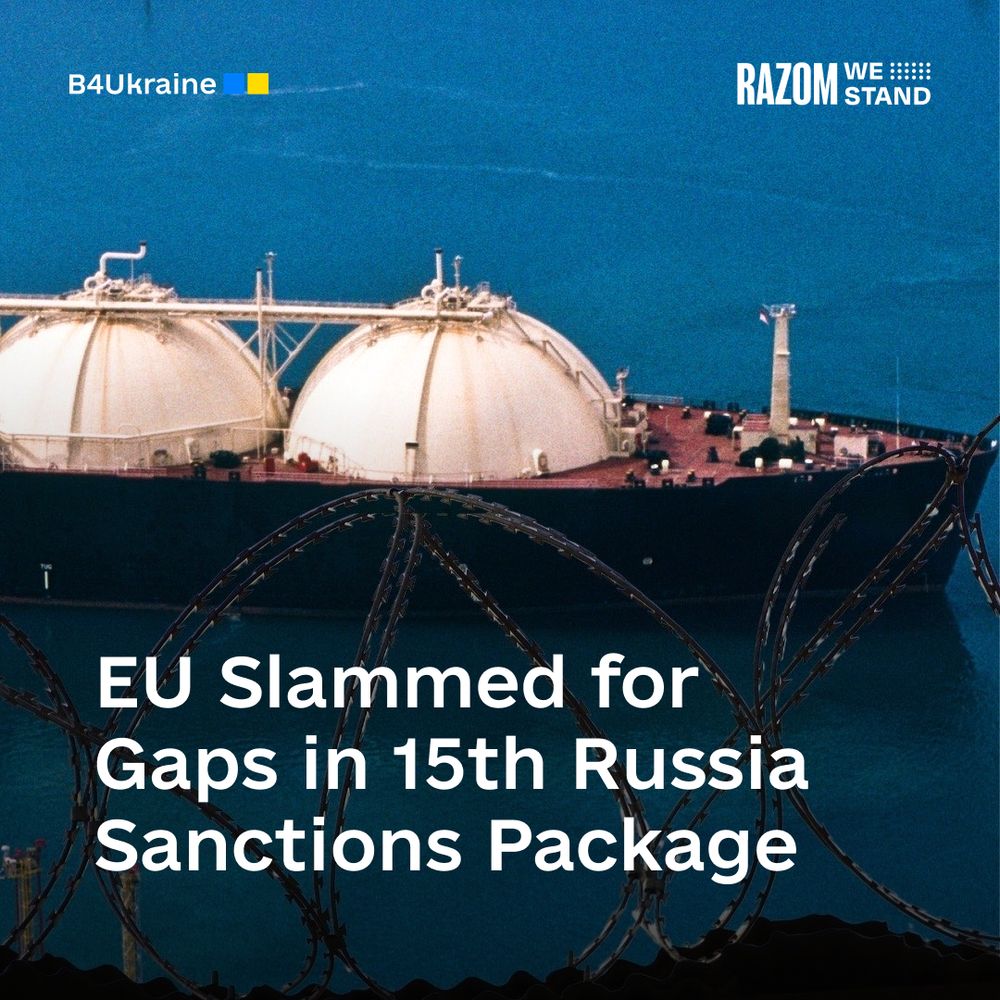
The Business4Ukraine coalition members, including the Ukrainian clean energy campaign group Razom We Stand, call on the European Union to go beyond timidly incremental and insufficient measures that are included in the EU’s 15th sanctions package. The sanctions regime is still being undermined by glaring loopholes that enable Russian fossil fuel revenues to fund its war machine. These gaps in energy sanctions—including no restriction on liquefied natural gas (LNG) imports, unhindered operation of the shadow fleet, and imports of refined oil products made from Russian crude—allow billions of euros to flow into the Kremlin’s war coffers.
Svitlana Romanko, Founder and Director of Razom We Stand, said: “Russia’s relentless war on Ukraine has devastated our nation—leaving thousands dead, millions displaced, and our energy infrastructure in ruins. Yet, Europe continues to indirectly fund this brutality through loopholes that allow billions to flow into Putin’s war chest. A full ban on Russian LNG, enforcement against the shadow fleet, and closing the refining loophole are not just policy changes—they are moral imperatives to save lives, restore Ukraine’s freedom, and uphold international law.”
Nezir Sinani, Executive Director of B4Ukraine, said: “We are now in the 15th round of sanctions packages, leaving the EU with no excuse to delay; it must mobilise political will to close these gaps immediately. The time for half-measures is over; decisive action is needed now to cut off the Kremlin’s war funding once and for all.”
Russia’s genocidal war in Ukraine has caused over 1 million casualties and $500 billion in damages. It shows no sign of stopping, as we saw this week with a brutal missile attack in Zaporizhzhia that killed eight people. Meanwhile, the EU has purchased an estimated €210 billion of fossil fuels from Russia since its full-scale invasion of Ukraine, and the average EU citizen has paid more than €468 for Russian fossil fuels since the start of the invasion until the end of November 2024, with much of that revenue funding its military aggression.
The three main loopholes in energy sanctions that enable Russia to fund the war are as follows:
1. EU’s ongoing LNG imports: Since the full-scale invasion began, the EU has purchased more than half of all Russian LNG exports. Despite LNG accounting for only 5% of the EU’s total gas consumption, the bloc remains a crucial market for Russia. A complete ban on Russian LNG imports would significantly disrupt Kremlin revenues with minimal impact on EU energy security.
2. Unhindered operations of the shadow fleet: Russia’s underinsured shadow tanker fleet circumvents the G7 oil price cap and poses severe environmental risks. Over 600 ‘shadow’ tankers operate with opaque ownership and outdated vessels, with many transiting through EU-adjacent waters, including Germany’s Baltic coast. More sanctions and more stringent enforcement against these vessels are urgently needed to prevent both economic and ecological crises.
3. The refining loophole: Russian crude oil is refined in increasing volumes into products like diesel and jet fuel in third countries such as India and Turkey, and then imported into the EU, bypassing sanctions. EU imports of these products perpetuate Kremlin revenues. Closing this loophole by banning imports of products derived from Russian oil would enhance sanctions’ effectiveness without significantly affecting European markets, as can be seen clearly in the case of the Czechia exemption.
While existing energy sanctions are estimated as having reduced Russian fossil fuel export revenues by an estimated €3.5 billion per month (a 12% reduction since the sanctions were implemented), flaws in enforcement have allowed Russia to regain ground in 2024. Crude oil export earnings increased by 5% in the first eleven months of 2024 compared to the same period last year. This rebound has supported a 58% increase in Russian military spending for 2024, the highest since the Soviet era, further fueling its attacks against Ukraine.
Sanctions against Russian fossil fuels are vital for the planet and for achieving EU climate targets. Razom We Stand’s new research, outlined in its recent report, Bridging the Gap Between Peace and Climate Action, shows that robust sanctions on Russian fossil fuels could cut Russia’s oil and gas-associated upstream greenhouse gas emissions by 25% by 2030 and reduce end-use GHG emissions by 300 million tons of CO₂ annually if renewables replace Russian dirty energy in Europe and Asia.
The B4U coalition urges the EU to build on its successes by entirely banning Russian LNG imports, enhancing enforcement against shadow fleets, and closing the refining loophole. Supporting Ukraine’s energy resilience through decentralised renewable systems and boosting partnerships with Ukraine for grid modernisation are critical measures to strengthen Europe’s energy security and independence from Russian fossil fuels.
The organisation emphasises that strong, broad and system-changing sanctions that go beyond mere incrementalism in individual designations are necessary to meet the EU’s commitments under the RePowerEU plan to phase out Russian fossil fuels by 2027 while simultaneously promoting global climate goals and ending EU funding of Russia’s war budget.